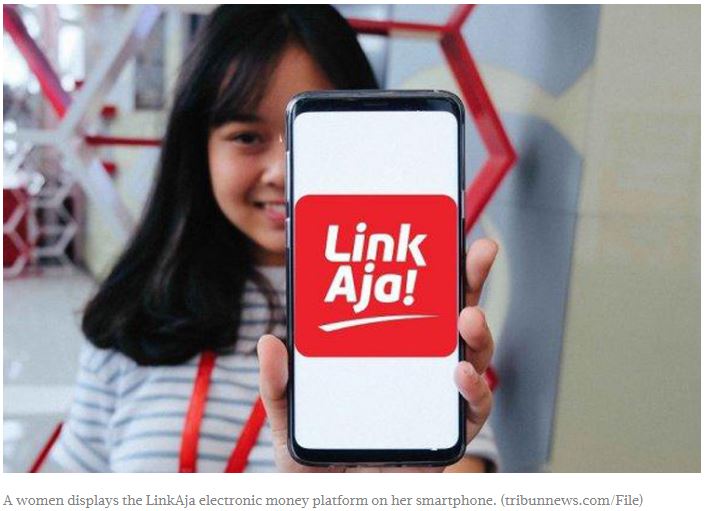Indonesia: New heavyweight ready to compete in payment services
The Jakarta Post/Jakarta
A new state-owned e-payment platform, LinkAja, has begun the second phase of its transformation into a stronger third bloc in Indonesia’s essentially duopolistic e-payment environment, which is now dominated by Go-Pay and OVO.
The transformation would allow state-owned lenders Bank Mandiri, BRI and BNI to transfer millions of users from their respective e-payment platforms (E-cash, T-Bank and UnikQu) into LinkAja’s system, consolidating them into a single state e-wallet.
“This is in line with the government’s National Non-Cash Movement [GNNT] because LinkAja’s aim is to complement Indonesia’s digital payment ecosystem,” said Danu Wicaksana, director of PT Finarya, which owns LinkAja.
He was referring to Bank Indonesia’s move to provide financial inclusion to the two-thirds of Indonesian adults who do not have bank accounts.
Danu said he was barred from revealing the finer details of LinkAja’s competitive features before the State-Owned Enterprises Ministry does.
However, publicly available information shows that the first phase of the state e-wallet’s transformation began on Feb. 22, when more than 25 million users of the T-cash e-wallet, owned by mobile operator Telkomsel, migrated into LinkAja’s system.
The mass exodus crashed LinkAja’s system and customers took to Twitter to vent their frustrations, forcing the company to postpone any new migrations until the following week of Feb. 27.
This second phase may involve at least 5.2 million users migrating into LinkAja’s system, which would bump up its user base to 30.2 million.
In comparison, Lippo Group-backed OVO claims to serve more than 60 million middle-class users, while Go-Pay claims 115 million users based on Go-Jek application downloads.
Nevertheless, LinkAja’s second migration appears to be going smoother as the system has yet to crash despite tweets complaining about blocked accounts and un-migrated funds.
As Danu mentioned, LinkAja’s official purpose is to improve financial inclusion, but it has yet to offer a major differentiation in services compared to Go-Pay and OVO.
The state-owned e-wallet, which does not require users to have bank accounts, allows top-ups to a maximum of Rp 10 million (US$708), cashless payments, interbank transfers and cash withdrawals.
LinkAja, thus far, only charges fees for top-ups, cash withdrawals and interbank transfers. It does not charge for payments.
Perhaps LinkAja’s most unique offering is a little, red near-field communication (NFC) sticker that users are able to attach to their phones, allowing slightly faster transactions than QR codes, which are championed by both Go-Pay and OVO.
Instead, LinkAja is part of the state-owned banks’ reaction to rising concern that independent fintech companies may disrupt their bottom lines, similar to how AliPay and WeChat Pay loosened the control of China’s state lenders over transactions.
These Indonesian e-wallets are competing for pieces of a pie that is poised to grow 16-fold from $1.5 billion in 2018 to $25 billion by 2023, according to a recently published Redseer report.
The report also says that Go-Pay has the greatest market share, followed by OVO and then by T-Cash.
OVO director Harianto Gunawan told The Jakarta Post that his company’s competitive edge was its adaptability, which allows OVO to be integrated into the systems of other companies such as the Grab ride-hailing company and the Tokopedia e-marketplace.
“We support digital payments for several industries including transportation, retail and e-commerce and various SMEs [small and medium enterprises] in more than 300 cities in Indonesia, all within less than two years,” he said.
Meanwhile, Go-Pay spokesperson Winny Triswandhani said her company’s competitive edge was its investments in educating Indonesian consumers about moving to a cashless economy, “especially those from lower income brackets”.
Go-Pay’s cashless promotion programs include its captive Go-Food Festival, whereby consumers can only purchase items using Go-Pay, and its Go-Food Wirausaha entrepreneurship program, whereby entrepreneurs are coaxed into using Go-Pay.
Furthermore, Go-Jek claims partnerships with more than 320,000 SMEs, while OVO claims 180,000 and T-cash claims 52,000.
Despite their higher market shares, the two private e-wallets are also notorious for burning through tens of millions of dollars in nationwide cashback programs since last year to secure leading positions.
Observers frequently criticize this “money burning” market penetration strategy as both artificial and unsustainable.
Nevertheless, LinkAja has thus far adopted a similar strategy by offering a maximum of Rp 10,000 in cash back per transaction, which is lower than Go-Pay’s maximum of Rp 20,000 and OVO’s Rp 60,000.
Source: https://www.thejakartapost.com/news/2019/03/05/new-heavyweight-ready-to-compete-in-payment-services.html


 English
English




